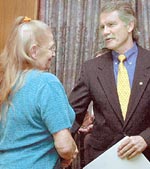Governor apologizes for
eugenics

KOBBI R. BLAIR / Statesman Journal

Velma Haynes of Portland thanks Gov. John
Kitzhaber on Monday at the Capitol for apologizing for the state’s use
of forced sterilization.
|

KOBBI R. BLAIR / Statesman Journal

Gov. John Kitzhaber stands with Ruth Morris, who
was forcibly sterilized while she lived at Fairview Training Center
between 1965 and 1972. |
Oregonians’ hearts go out to victims of
forced sterilization, Kitzhaber says.
LAURENCE M. CRUZ
Statesman Journal
December 3, 2002
At a Capitol ceremony packed with victims and their
advocates, Gov. John Kitzhaber apologized Monday for the state’s past practice
of forcibly sterilizing people in its care.
Kitzhaber became the second governor in the nation to
formally apologize for a state’s practice of eugenics, the movement that
spawned involuntary sterilization laws in 33 states in the first quarter of the
20th century.
“The time has come to apologize for misdeeds that resulted from widespread
misconceptions, from ignorance and from bigotry,” Kitzhaber told the crowd of
about 80 surviving victims, their caregivers and advocates, as well as a throng
of reporters and TV crews.
“To those who suffered, I say the people of Oregon are sorry,” said the
Democratic governor, who leaves office at the end of the year. “And our hearts
are heavy for the pain that you endured.”
Kitzhaber also designated Dec. 10 as Human Rights Day in Oregon, in celebration
of the state’s commitment to human decency and personal freedom, he said.
At least 2,648 people were sterilized in Oregon between 1917 and 1981, most
while in state care. Many, such as Velma Haynes, 68, of Portland, were patients
at Fairview Training Center in southeast Salem at the time. “Although it can
never take the pain away, your apology is gratefully appreciated and
accepted,” said Haynes, who was was sent to Fairview at age 2 and sterilized
at age 15 as a condition of release.
Proponents of eugenics sought to breed a better human race by preventing those
with traits they deemed undesirable from having children. The practice targeted
a broad range of individuals, from the disabled and the epileptic to criminals,
promiscuous girls and homosexuals, among others.
The apology had been sought since July by a coalition of 17 social and
professional groups, after the governor of Virginia issued a similar apology in
the spring. Of the 33 states that sanctioned the sterilizations, Oregon ranked
ninth in the number of victims, coalition spokesman Steve Weiss said. “I want
to emphasize that this is your day,” he told the surviving victims before
Kitzhaber took the podium. “I hope it helps to heal some of the pain.”
A spokeswoman for the gay and lesbian community said gay men were targeted
because prevailing thought put them in the same category as rapists, child
molesters and other sexual predators. “Acceptance and equality were not even
considered as an official response,” said the spokeswoman, Roey Thorpe,
executive director of Basic Rights Oregon.
Sterilizations were legally authorized at Fairview, then named the State
Institution for the Feeble-Minded, after the Oregon Legislature formed the State
Board of Eugenics in 1923. Oregon took a tougher line than many other states,
often preferring castration over vasectomies. At least one woman died while
recovering from a hysterectomy. Until reforms in 1967, sterilization often was
used as a condition of release from state institutions. The Board of Eugenics
was abolished in 1983 — a move supported by Kitzhaber, who was a Roseburg
senator at the time.
Not all the surviving victims present Monday were satisfied with the apology.
“I want more than an apology,” said Ken Newman, 61, who as a teenager was
given a vasectomy at Fairview after he was pulled from a square dance to sign
what he thought were his release papers. “I would like to be compensated
money-wise.” Newman met his wife, Shirley, at Fairview, and the couple married
in 1970. Now 64, she was sterilized at age 19. But Newman said he can’t find a
lawyer to handle the case. “Everyone that we talk to, they want to sweep it
under the rug,” he said. Weiss said the desire for monetary relief is common
among victims, but he said reparations would be a long shot in the current
economic climate. “Ideally, I’d like to see it,” he said, “but we’re
not in ideal conditions.”
Laurence M. Cruz can be reached
at (503) 399-6716.

